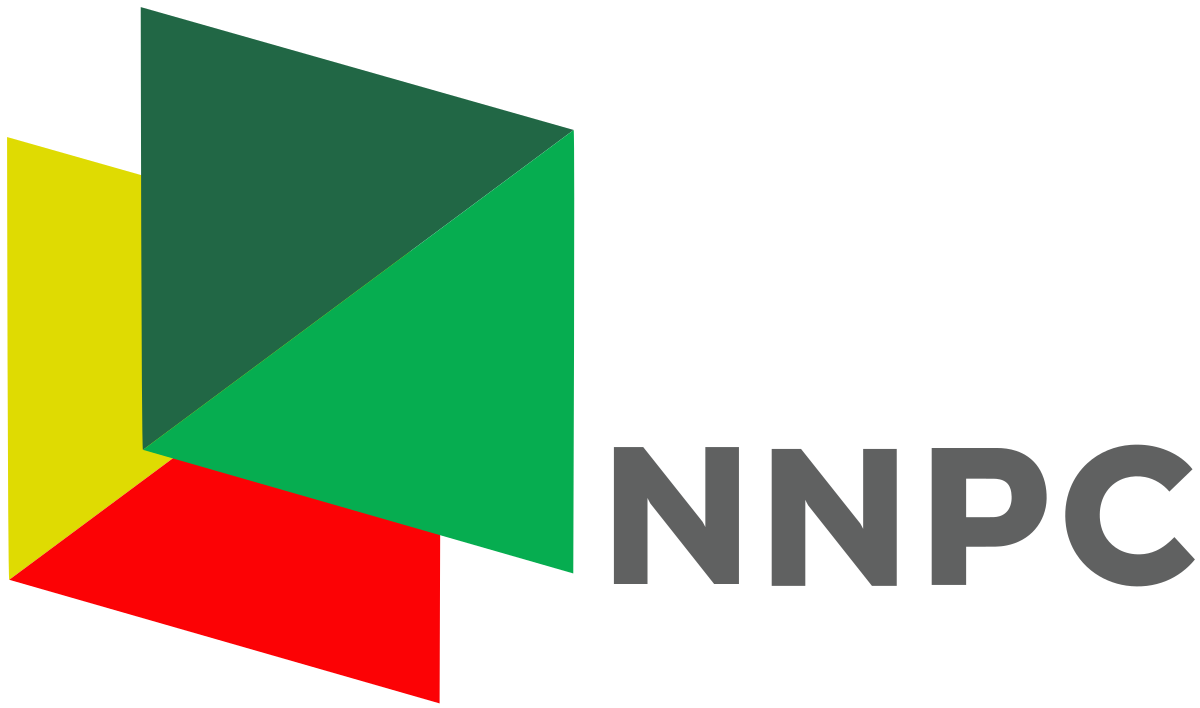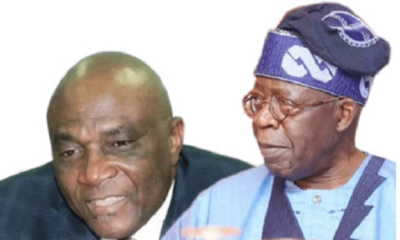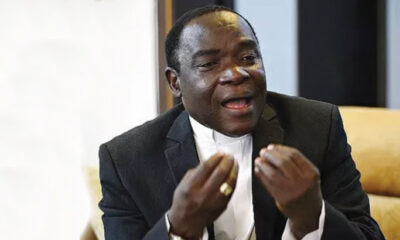News
NNPCL Ends Fuel Import Dec 2024, Projects ₦4.5 Trillion Revenue

The Nigerian National Petroleum Company Limited, on Thursday, said it would end the importation of refined petroleum products by December 2024 as all the country’s refineries would be operational by then.
It also projected that the national oil firm would grow its revenue to N4.5tn at the end of 2023 adding that the rehabilitation of the Port Harcourt Refining Company, under NNPCL’s management, would be completed by December this year.
The Group Chief Officer of the NNPCL, Mele Kyari, disclosed this when he led officials of the company to a meeting with the Speaker of the House of Representatives, Tajudeen Abbas, where the lawmaker called for the privatisation of Nigeria’s refineries.
Also, oil marketers, on Thursday, confirmed the readiness of the Port Harcourt refinery, as they stated that its operations, which could begin in January 2024, would lead to a considerable drop in the prices of refined petroleum products.
At the meeting in Abuja, Kyari declared that Nigeria was on track to stop the importation of refined petroleum products in 2024 and would emerge as a net exporter of the commodities in the same year.
He also provided explanations on the commencement of operations of the Port Harcourt, Warri, and Kaduna refineries
The company’s helmsman said all refineries would become fully operational, adding that the country would become a net exporter of petroleum products by the end of 2024.
Fuel subsidy
He blamed the petroleum subsidy for inactive refineries in Nigeria over the years, stressing that the removal of the subsidy was already attracting a lot of private-sector investments.
Kyari stated, “I can confirm to you that by the end of December this year, we will start the Port Harcourt refinery; early in the first quarter of 2024, we will start the Warri refinery and by the end of 2024, Kaduna refinery will come into operation.
“This is the commitment we are giving today and you can hold us accountable for this. In 2024, many of the initiatives including the rehabilitation of our refineries and also the efforts of small-scale refineries, and the upcoming Dangote refinery, will make Nigeria a net exporter of petroleum products in 2024.
“We will no longer be talking about fuel importation by the end of 2024. I am very optimistic that this will crystallise,” he said.
Kyari pledged that by the end of 2023, the expected government revenue from the company would hit N4.5tn, as NNPCL now returns value to shareholders in compliance with the Petroleum Industry Act.
In October 2023, The PUNCH reported that Nigeria was spending about N843bn monthly on the importation of Premium Motor Spirit, popularly called petrol, following the halt in oil swaps by NNPCL.
The Nigerian Midstream and Downstream Petroleum Regulatory Authority stated in July this year that between June 1 and June 28, 2023, which was described as the post-deregulation period, the total petrol consumption across the country was 1.36 billion litres, while the average daily consumption was put at 48.43 million litres.
The average ex-depot price of petrol from the only importer of the commodity, NNPCL, is about N580/litre.
But the NNPCL and oil marketers stated on Thursday that this huge oil import fund would drop soon as the Port Harcourt refinery would start producing refined petroleum products from January 2024 barring any unforeseen circumstances.
Confirming the readiness of the plant, the President of the Petroleum Products Retail Outlets Owners Association of Nigeria, Billy Gillis-Harry, told one of our correspondents that he visited the facility to get first-hand experience and saw that it was ready.
The Federal Government announced in August this year that the rehabilitation of the Port Harcourt refinery would be completed in December 2023.
When contacted on Thursday to tell the current stage of repairs at the facility, the Chief Corporate Communications Officer, NNPCL, Olufemi Soneye, replied, “Scheduled for the end of December 2023, the Port Harcourt refinery project is proceeding as planned without any issues. The delivery date stands. The work is ongoing.”
PETROAN president
The PETROAN president said the Port Harcourt refinery was on course to begin operations, based on findings by the oil union at the facility.
Gillis-Harry said, “I can confirm to you that the refinery is getting set for production. I’ve been there and I’m still going there tomorrow (Friday) morning. One area is going to be active but I want to be there and take a photograph of the place, with me standing by it and I will send it to you.
“The Port Harcourt refinery is on course. I am working on a committee that is reviewing these issues. I won’t tell you the name of the committee because it is a secret mission. However, I can assure you that they are already set.’
“There are quite a lot of products there and it is not difficult for them to set it up and start pumping. So they should be set to produce and deliver by January, and tomorrow (Friday) if you call me in the morning I’ll be in the refinery and I’ll speak to you on video for you to know what I’m talking about.”
Gillis-Harry stated that anytime the Port Harcourt refinery kicks off, the cost of PMS would drop.
“It is simple, there are so many inputs that are going to be removed from PMS cost, such as cost of importation, ports rate, and shipping. From here, you can load products and move them to far locations in Nigeria.
“So all we need to do is just to ensure equitable distribution of what is being produced. Therefore once the refinery starts pumping out products it will save forex for the Federal Government.’’
On his part, the National Secretary of the Independent Petroleum Marketers Association of Nigeria, Chief John Kekeocha, urged the NNPCL to ensure that the Port Harcourt refinery begins operations as targeted.
“The refinery will, of course, help to augment fuel supply by addressing the crisis of fuel shortage and its high cost in Nigeria. Once it begins operations in December or January as the case may be, it will augment supply both in price and quantity.
“So if they can do that, fine. And maybe after that, they can shift to the Warri and Port Harcourt refineries. This will help a lot and we don’t want excuses this time. They must work hard to meet this target because the impact on the economy is going to be massive.’’
Meanwhile, Kekeocha explained that since crude oil was a significant component in the production of refined petroleum products, the cost of the commodity would still determine the price of products that would come from the refinery.
“When the Port Harcourt refinery begins to produce, since we are practising deregulation, if the price of crude drops, the refined products will be cheaper, but if crude oil increases in price, it will make the price of these refined products rise.
“This is because the crude oil refiners are going to buy the product based on its international rate. But the only way it will not affect us is if we are practising subsidy.’’
‘Privatise refineries now’
At the meeting with NNPCL officials, the Speaker of the House of Representatives called for the privatisation of oil refineries in the country to address the perennial crisis bedeviling the oil sector.
While describing the state of the refineries as shameful, Abbas added that NNPCL workers’ work hours in the last 20 years could be less than a month, yet they get paid, promoted, and cared for.
He said, “There is a need to make these refineries have multi-dimensional uses. If there is no crude oil, are there other activities that can make the workers active so that what they earn is deserved? I need you and your management to look at how we can turn around these decades of losses.
“One way to do so is to find a way to privatise these refineries. We have spent so much money and time deceiving ourselves that some businesses can be run by the government.
“In the case of the refineries, we have now realised that some sectors of NNPCL
business can only be handled by the private sector and our refineries are one of those.
“The inadequacies will become manifest as soon as the Dangote refinery comes on board because the competition will be there and inefficiencies of the refineries will become more naked.
“I want you to put it as part of your cardinal objectives ways to privatise our refineries so that they can be active. Shortly, they will be able to compete with new refineries that will come up,” he said.
Abbas said that the NNPCL is central to the economic development of Nigeria pledging the commitment of the house to supporting the company to succeed.
According to him, the House is concerned about the high rate of oil theft, saying it is draining revenue, affecting forex availability, and causing inflation in the country.
The Speaker maintained that the House had inaugurated a special committee on oil theft to interface with stakeholders to address oil theft in the country.


 Top Stories9 hours ago
Top Stories9 hours agoDele Farotimi Speaks on Lying Against Afe Babalola After Gaining Freedom

 News18 hours ago
News18 hours agoBREAKING: OZA CARNIVAL SECURES TOLARAM GROUP, ZENITH BANK PARTNERSHIPS

 Politics9 hours ago
Politics9 hours agoPDP Picks Holes In President Tinubu’s Media Chat

 Top Stories9 hours ago
Top Stories9 hours agoCourt Orders DSS To Release Miyetti Allah President Pending Trial

 News9 hours ago
News9 hours ago100+ Merry Christmas Wishes and Prayers to Send to Family & Friends on Xmas 2024

 Entertainment8 hours ago
Entertainment8 hours agoProphet Odumeje issues warning to those discrediting his miracles

 Entertainment8 hours ago
Entertainment8 hours agoComedian AY Clarifies Claims Of Shading Funke Akindele, Toyin Abraham,Ladies In Hollywood

 Top Stories7 hours ago
Top Stories7 hours agoNigeria’s lack of progress because they chose darkness over light – Kukah







